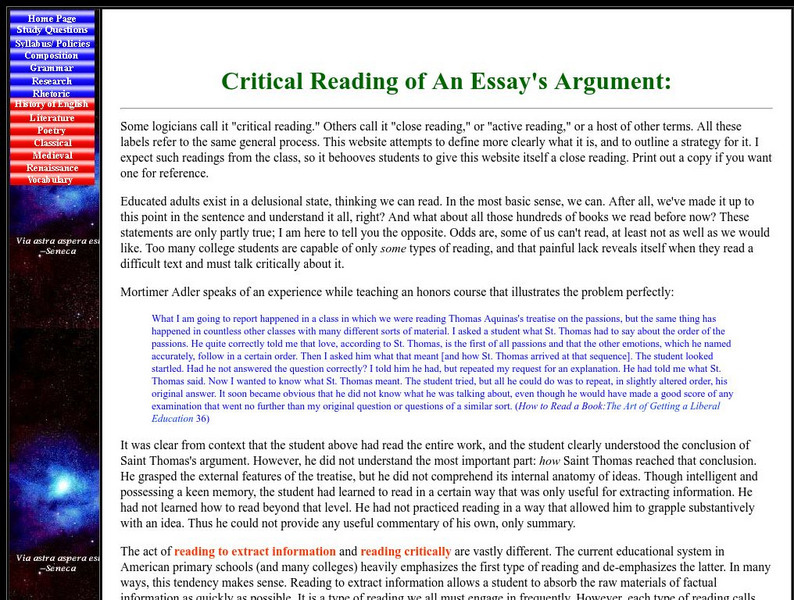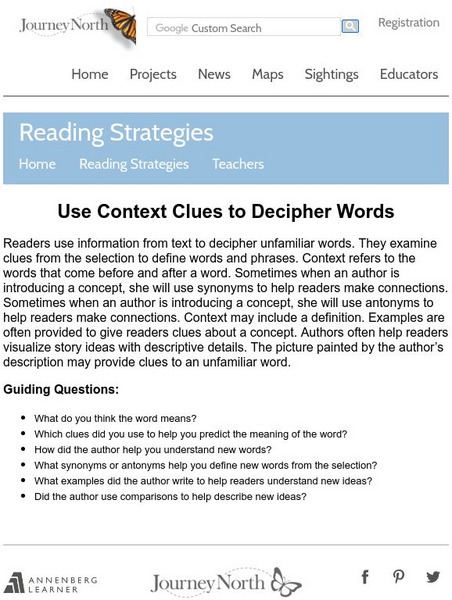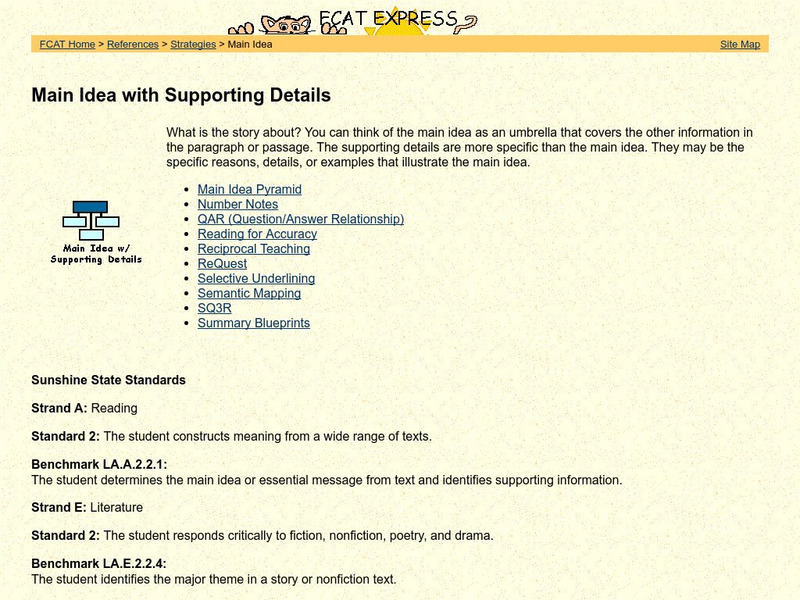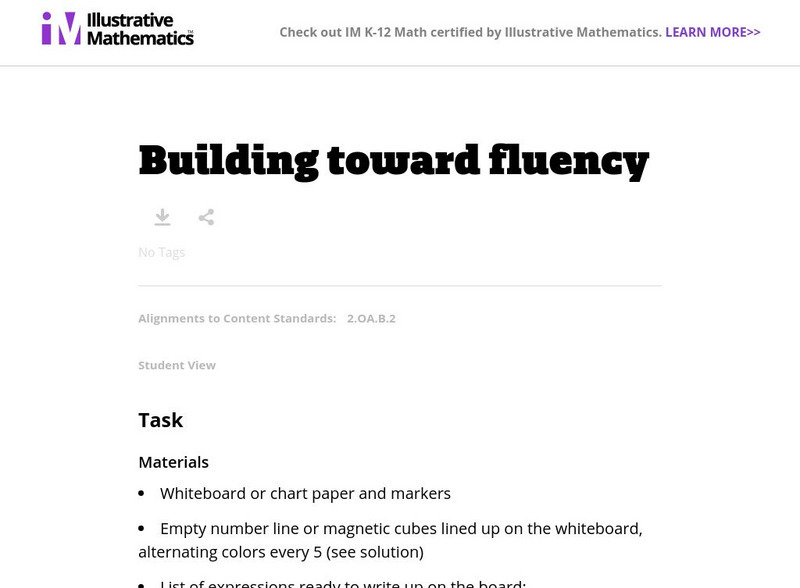Other
Carson Newman College: Critical Reading of an Essay's Argument
Extensive examination of what it means to critically read an argument. This process is sometimes called "critical reading," or "close reading," or "active reading." First the differences between reading to extract information and reading...
Pennsylvania State University
Pennsylvania State University (Dr. Mc Clennen): How to Do a Close Reading
This guide is written for college students, but should be very useful for upper level high school students as well. The writer first describes fourteen steps to take in doing a close reading, then provides six pieces of advice on how to...
Sophia Learning
Sophia: Reading Comprehension and Classroom Discussions
This tutorial focuses on active reading comprehension strategies including reading aloud, taking notes, summarizing, and writing in the margins of books to improve retention and class discussion. It includes two Flickr videos on active...
ReadWriteThink
Read Write Think: Oral Presentation Rubric [Pdf]
This reproducible resource provides an assessment rubric to be used with students' oral presentations. CCSS.ELA-Literacy.CCRA.SL.4
Curated OER
Mc Graw Hill: Part 1: Reading Literature: Show Understanding of Text
This quick lesson from the Common Core Literacy eHandbook teaches students what questions to ask and how to answer questions to show your understanding of literature.
Annenberg Foundation
Annenberg Learner: Journey North: Reading Strategies: Use Context Clues to Decipher Words
This reading resource discusses the strategy of using context clues to decipher new words. A list of guiding questions is provided to help students as they use context clues to understand new words.
Other
Curriculum Associates: Determining Theme or Central Idea [Pdf]
For this reading comprehension lesson unit, students are guided in learning how to find the main theme or idea of a text and understanding how details in the text convey that. Includes lots of exercises and examples, as well as...
McGraw Hill
Mc Graw Hill: How to Use Strategies to Teach Students to Access Complex Texts
In this short video, the strategies of summarizing, clarifying, and asking-answering questions are used. These instructional tools will help teachers show students how to access complex texts. [5:54] CCSS.ELA-Literacy.CCRA.R.10
TES Global
Blendspace: rl.k.5 Recognize Common Types of Texts (e.g., Storybooks, Poems).
In this module, students will read two texts on the topic of pancakes and distinguish between the text that is a storybook and the text that is a poem.
Read Works
Read Works: Aztecs, Incas, and Mayans the Aztec Empire
[Free Registration/Login Required] This nonfiction passage provides information about the ancient Aztec Empire, including the significance of Montezuma and Tenochtitlan. This passage reinforces essential reading comprehension skills....
Texas Education Agency
Texas Gateway: Themes in Literary Texts (English 6 Reading)
Learn how to infer the implicit theme in a work of fiction, distinguish theme from topic, and make complex inferences using textual evidence.
Sophia Learning
Sophia: Evaluating the Connotation
This lesson focuses on evaluating the connotation of a vocabulary word. It defines connotation and gives an example. It details three steps: read the word in context, determine the tone of the overall reading, and compare the tone with...
Curated OER
Mc Graw Hill: Compare Points of View Narrator
Read a passage from a story to determine who is the narrator and what is the narrator's point of view. An additional practice exercise is available. CCSS.ELA-Literacy.CCRA.R.6
Alabama Learning Exchange
Alex: Think, Write, Read: Expository Writing
While this lesson's main focus will be centered on expository writing, it will also integrate reading, computer, and organizational skills. After reading the novel, Shiloh by Phyllis Reynolds Naylor, students will write an expository...
University of South Florida
Fcat Express: Main Idea With Supporting Details
Strategies to help students recognize main ideas and supporting details provided by a standardized test preparation site intended for fourth grade. Includes strategies such as Main Idea Pyramids, Number Notes, QAR (Question/Answer...
Better Lesson
Better Lesson: I See the Weather
Students will answer text-dependent questions for the expository text "Seasons and Weather". While text-dependent questions have been around for a long time, Common Core asks teachers to focus on them during reading. This lesson includes...
Thinkport Education
Thinkport: Writing Explanation Part 1: Claims, Evidence and Reasoning
In this module, students will explore how claims, evidence and reasoning are used to write an effective explanation. Students will read an article that addresses the question of whether climate change is now confirmed after record high...
Thinkport Education
Thinkport: Writing Explanation Part 1: Claims, Evidence and Reasoning
In this module, students will explore how claims, evidence and reasoning are used to write an effective explanation. Students will read an article that addresses the question, "Should Congress consider comprehensive climate change laws?"
Annenberg Foundation
Annenberg Learner: Literature: Analyzing Theme
Article explains how to find the theme in a piece of literature by asking yourself a series of questions as you read. RL.9-10.1 Analyzing Theme. CCSS.ELA-Literacy.CCRA.R.2
Illustrative Mathematics
Illustrative Mathematics: Building Toward Fluency
The purpose of this task is to promote certain addition strategies that will help students learn to fluently add and subtract within 20. Students will use a number line or magnetic cubes to solve addition problems. Students will be asked...
Other
Beacon Educator: Reading Educator: Dictionary Game
Develop better vocabulary and dictionary skills while playing this fun dictionary game with students in small groups. Click on the video link to watch the game being played in a classroom. L.9-10.4c References
E Reading Worksheets
E Reading Worksheets: Main Idea Structure and Valentine's Day Worksheet
Written exercises related to identifying the main ideas and details are provided on this module. Students will enjoy learning about Valentine's Day in these text structure exercises.
Hopelink
Hopelink: Reading Lesson Idea: Vocabulary Games
Begin building a better vocabulary through this comprehensive lesson plan with vocabulary games. L.11-12. 6 Vocabulary
Curated OER
Mc Graw Hill: Informational Text: Determine Central Ideas and Supporting Details
Read a short informational text and determine the main idea and supporting details. Click to check your answers then click on Practice.



![Read Write Think: Oral Presentation Rubric [Pdf] Graphic Read Write Think: Oral Presentation Rubric [Pdf] Graphic](https://d15y2dacu3jp90.cloudfront.net/images/attachment_defaults/resource/large/FPO-knovation.png)














